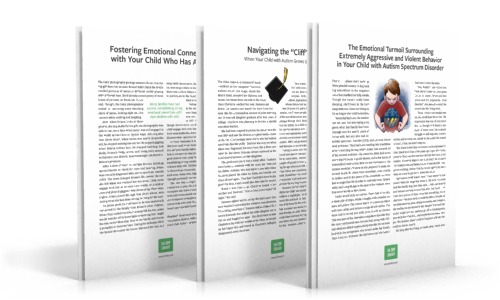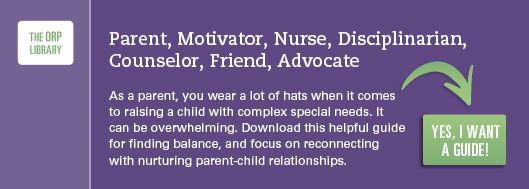Choosing Out-of-Home Care for Your Child with Prader-Willi Syndrome
Written By: Alison Hennessee
Resource Creation By: Bridget Morton
Designed By: Sunny DiMartino, Christy Bui, Nathan Lueth
These days, Derek* doesn’t lock the refrigerator. The chain he used to wind around the handles is coiled in a junk drawer under a pile of rubber bands and take-out menus. There’s still a safety clasp on the door to the pantry, but it hangs open now, the padlock that once secured it now nestled beside bulk bags of grains and unsalted nuts. Derek often tosses his wallet on the counter after he gets home from work. His daughter Jess hangs her purse on the coat hooks by the front door during visits home from college. Nobody screams in Derek’s house anymore, unless the Bears are on another losing streak. Derek doesn’t reflexively wince when his phone rings, and once he has gone to bed, he doesn’t get up again until morning.
None of this may seem remarkable. This is the way most people live; it’s what we usually call “normal.” But normal is relative.
When doctors determined that Derek’s son Christopher had Prader-Willi Syndrome, the diagnosis was daunting. For Derek, though, it also brought relief; there was a clear reason for Christopher’s struggles. Derek was determined to be a perfect parent to Christopher, and to do that, he needed to know everything there was to know about PWS. The more Derek learned about the disorder through medical journals, seminars, and correspondence with neurologists and geneticists across the country, the more deeply involved he became in the management of Christopher’s treatment. He took his son to speech therapy, physical therapy, and occupational therapy, on top of attending every appointment with Christopher’s regular doctor and numerous specialists. Christopher had been accepted into a group study in Madison, Wisconsin, and every three months, Derek made the journey with Christopher. The drive should take under three hours, but it usually extended to five or six because Christopher needed frequent stops to prevent meltdowns. Whenever a doctor prescribed Christopher a new medication, Derek started an Excel spreadsheet to track the dosage and effects. Christopher hated exercise, but Derek wheedled and cajoled until he was able to get Christopher to amble around the block after dinner most days, Derek holding his hand the whole way. A physical therapist came to the house three times a week, and Derek worked with Christopher on the days she wasn’t there, spending hours teaching Christopher to hold his legs just so.
It wasn’t all work. Christopher loved cartoons. It didn’t seem to matter which ones, as long as they were bright and lively, full of music and movement. On Saturday afternoons, Derek would put a Disney movie on the TV in the basement rec room. Christopher would clamber onto the futon, his face brilliant with anticipation, and pat the cushion beside him until Derek settled in, too. Then Christopher would settle against his father to watch the movie. It seemed to Derek that no matter how many times they watched their favorites, Christopher was equally delighted, just as full of wonder as the first.
Derek had always been close to his son, but after he and Rita divorced, the bond became even stronger. Christopher was everything to Derek. Derek was everything to Christopher. This arrangement worked — or at least, for a time, it seemed to. But every day there was just a little more to handle.
Of course, there had always been the problems with food. Christopher’s drive to eat had kicked in when he was a toddler and had worsened with time. But though Christopher certainly had the hallmark symptom of PWS, it wasn’t nearly as intense as for many. Derek could generally count on a locked fridge and restricted access to money being enough to prevent Christopher getting food he wasn’t supposed to eat. From his reading and conversations with other parents, Derek knew he was lucky in this regard.

Food, however, wasn’t the only minefield. As Christopher got older, his behavioral issues became more profound. First, it was the dropping. When Christopher didn’t want to do what he was told, he’d simply fall to the floor and refuse to move. At least once a week, Derek would get a call at his dental practice: “Mr. Mueller? Christopher won’t move. We need you to come down here.” And Derek would sigh, push all his appointments back an hour, and go try to coax his son off the floor.
Then again, Derek would tell himself as he drove back to the office after another dropping episode, falling on the floor wasn’t so bad. There were much worse things in the world, weren’t there? If Derek had to go over to the school every so often to get Christopher off the bus or into the music room, so be it. That was doable.
Then Christopher started getting angry at his classmates—nothing too serious, just a shout when someone took the marker Christopher had been reaching for or a small shove if someone was too slow in the lunch line. Derek was certain this was just a phase. Christopher, unlike many people with PWS, had a significant intellectual disability. It was hard for him to use words to express himself, and so it was understandable that sometimes, his feelings boiled over. If Derek and the therapists worked with Christopher to reduce his frustration, surely the aggression would decrease, too. That was what Derek thought — what he hoped.
The picking was the last straw. For Christopher, as for many people with PWS, picking was a compulsion. The smallest hangnail or bug bite was enough excuse for Christopher to dig deep into the skin with his fingernails, scratching until the wound was raw and ragged. Derek did his best to cover any little scrapes or bites Christopher got — this seemed to deter Christopher some — but it was impossible for Derek to completely prevent Christopher from picking. At any given moment, Christopher sported at least three Band-Aids, usually emblazoned with characters from Sesame Street or the latest Pixar movie.
Then came the meeting at school. It wasn’t the first, not by a long shot — Derek had lost track of the number of evenings he’d spent in well-meaning but circular conversations with Christopher’s teachers. But this one was different. Derek had walked in expecting to see only his son’s teacher, but found instead not just Ms. Campbell, but also the principal, the vice-principal, the counselor, and the school social worker. It felt like an ambush to Derek. The principal, Ms. Wolfe, said Christopher had been picking at his ear until he’d made himself bleed during class. Apparently, he wouldn’t let anyone close enough to bandage his ear, just huddled in the corner screaming at the teacher and classroom aides, all the while making the injury worse. By the time an aide had been able to calm him, the entire left side of Christopher’s neck was running with blood and the collar of his shirt was soaked.
On the way home from the meeting, Derek drove fast and fumed, while Christopher sat quietly in the backseat. After what seemed to him like a lot of hemming and hawing, he’d gotten Ms. Wolfe to come to the point: she wanted Derek to consider out-of-home care for Christopher. “Resistant to our efforts,” she’d called Christopher. As if all children weren’t resistant sometimes, Derek thought, taking a corner a little more sharply than he’d intended. “Beyond our ability to manage,” she’d claimed. Derek had wanted to shoot back, “Beyond your ability to give a damn,” but he’d held his tongue. “Higher level of support,” she’d said. Christopher needed more support? Fine. Derek could do that himself. He just needed some time to get it all organized. This was nothing he couldn’t handle.
Derek jammed his foot on the accelerator as he approached a yellow light. It turned red just as he reached the intersection, but he sped through anyway. By the time he got home, he was shaking, partly from anger, but partly, if he were truly honest with himself, from exhaustion.
The next day was Saturday, and despite the tumult of the previous evening, the morning started off on a good note. Christopher had made it through the night without an accident, so both he and Derek were better rested than they had been for the last week. As Derek prepared breakfast while Christopher watched Looney Toons, he realized he’d forgotten what a difference to his clarity and mood a full night’s sleep could make. He had become so used to coping on less than the bare minimum.
On Saturday afternoons, Linda, a private speech therapist, came to the house to give Christopher some extra help. Derek greeted Linda, a tall woman with long silver-grey hair, and led her into the sunroom where Christopher was waiting. When he saw her, his face burst into a grin, and Derek, leaving the sunroom, smiled, too.
After the hour was up, Linda joined Derek in the kitchen to tell him about what she’d worked on with Christopher and update Derek on his progress. As Linda was describing a new approach she wanted to try, Christopher trundled into the kitchen, looking around hopefully for a snack. Derek noticed that Christopher was slouching, not using his core muscles to support himself like the physical therapist was trying to teach him.
“Hey, buddy,” Derek said, tousling his son’s sandy hair. “Remember how you and Greg talked about standing tall? Can you tell me how you’re supposed to do that?”
Christopher furrowed his brow, thinking. Then he shook his head. He frowned and picked absently at a scab on his elbow.
Derek moved his son’s hand from the sore. “Remember, Greg said to try to use your whole body to push you away from the ground.” Derek held one palm against Christopher’s back and used the other to press up on his chest. “Better. Why don’t you practice that for a bit?”
Christopher nodded glumly and left the kitchen, walking awkwardly as he tried to keep his chest high.
Derek turned back to Linda.
“Sorry about that,” he said, pouring both of them more coffee. “It’s hard to get Christopher to work on those exercises. Gotta keep at him. What were you saying about enunciation?”
But Linda didn’t respond. She was sitting back in her chair considering him. There was a long, quiet moment. Then she leaned forward, putting her elbows on the table.
“Derek, I know things have been rough with Christopher lately.”
Derek shrugged and sipped his coffee. “It’s just the nature of our situation. It’s hard, but we’ll get through it. We always do.”
Linda gave him a sympathetic smile. “Of course you will. But does it have to be like this? This is such a struggle, and if I thought it were the best thing for Christopher — and you — I wouldn’t say a word. But I’m not so sure it is. I think there are other ways to help him, ways that might actually in the end be surprisingly loving.”
Derek set his mug down a little too hard, sending coffee slopping over the rim. “Not you, too. The school thinks he needs out-of-home care. I can’t believe the nerve of those people. They just don’t want to do their jobs, that’s what it is.”
“No, Derek,” Linda said, shaking her head. “They are doing their jobs. It’s you who’s doing too many jobs.” Derek opened his mouth, but Linda held up her hand. “Right now, you’re trying to be Christopher’s everything. You want to be neurologist, nurse, physical therapist, speech teacher. But there are people who can do those jobs — really well, in fact.
“What Christopher needs you to be is his father. Maybe it’s time to think about what’s really the most loving path a father can take.”
Derek told her he’d consider it, mentally brushing her off out of habit; he’d spent a long time pushing away any hint of a thought that maybe he couldn’t do this.
After Linda left, Derek joined Christopher in the rec room, where they watched three Land Before Time movies in a row. During the last one, Christopher fell asleep with his head in Derek’s lap. The room was too warm and Derek’s legs were starting to fall asleep, but he didn’t move until long after the movie was over.
As he stroked his son’s hair, Derek couldn’t keep his mind from returning to Linda’s words. It had been a long time since he had been able to focus on what it meant to be a father, the job he’d always said was the most important one he’d ever have. At the school meeting, the principal had said she wanted to see Christopher thriving, and Derek had defensively insisted he already was. Now Derek wondered if maybe what he and his son were doing wasn’t really more like simply surviving.
At seven o’clock on Monday morning, Derek called the social worker at Christopher’s school.
“Hi, this is Derek Mueller calling about Christopher.” Saying his son’s name brought unexpected pressure to Derek’s throat, and he paused. “I’d like to talk about what would be best for my son.”
*Names have been changed to protect the privacy of the individuals interviewed for this story.

Sign Up to Receive New Posts
We promise not to spam you or share your information with anyone. And you can unsubscribe at any time . . . although we hope you stay a while!






